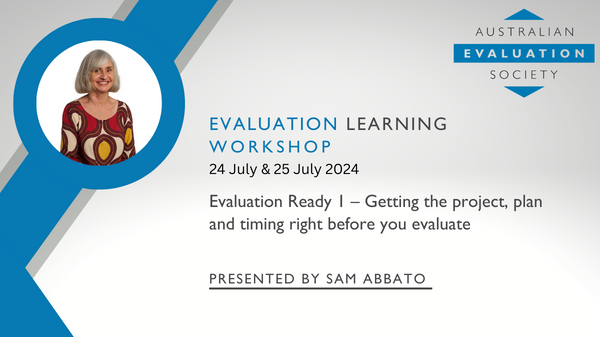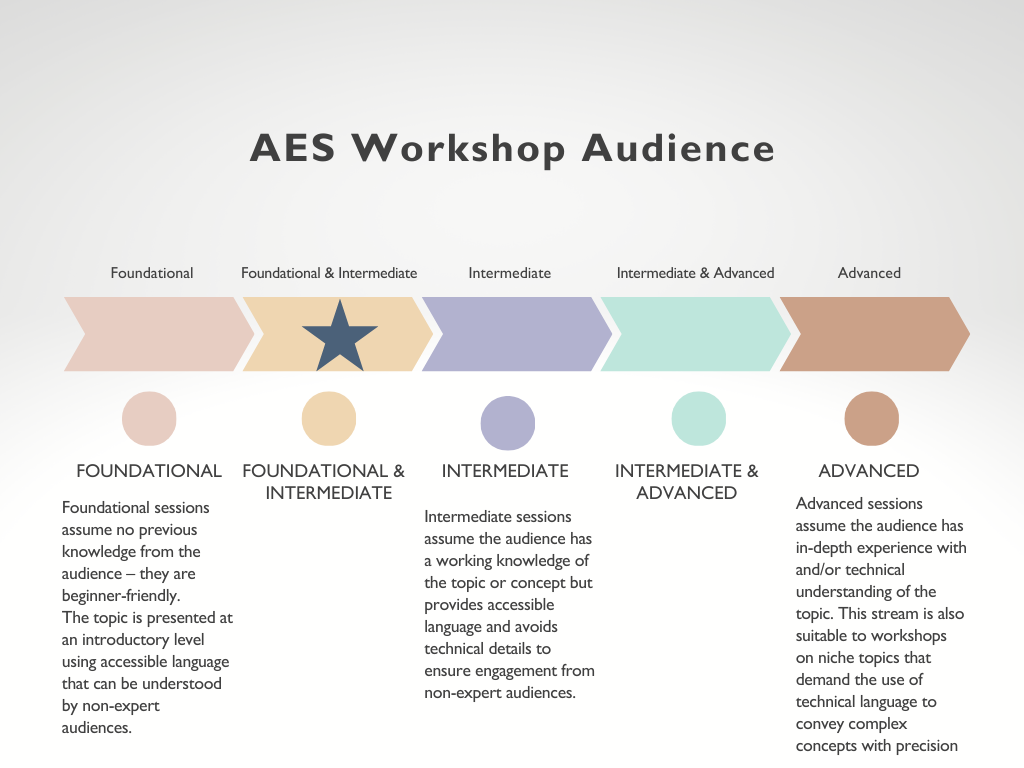Workshop: Evaluation Ready 1 – Getting the project, plan and timing right before you evaluate (Online 24 & 25 July 2024)

Workshop: Evaluation Ready 1 – Getting the project, plan and timing right before you evaluate
Date and time: Wednesday 24 July & Thursday 25 July 2024 9.30am to 1.00pm AEST (registration from 9.15am) Registrants are to attend both sessions. (full day workshop - 2 sessions)
Venue: Via Zoom. Details will be emailed to registrants just prior to the workshop start time
Facilitator: Dr. Samantha Abbato
Register online by: Tuesday 23 July 2024. Spaces limited to 25 participants
Fees (GST inclusive): Members $325.00, AES Organisational member staff $460.00, Non-members $535.00, Student member $155.00, Student non-member $250.00* (GST inclusive) *Students must send proof of their full-time student status to
Evaluation is essential for identifying if a project, program, or other initiative has made a difference, achieved intended goals, and how it can be improved. But evaluation takes time, energy, and resources, and the reality is that many evaluations are not used or are misused (Patton, 2015). Assessing the usefulness, readiness, and timing for an initiative (“evaluand”) to be evaluated before you start can provide valuable information for resource allocation, program improvement, and evaluation planning. Assessing evaluation readiness strengthens evaluation planning, program development and stakeholder relationships. Evaluability assessment is an approach that is gaining increasing momentum amongst evaluators as a way of improving evaluation (Lam & Skinner, 2021).
This workshop aims to provide participants with the knowledge, skills, and tools they need to start effectively assessing the evaluability of programs and other initiatives. Simple-to-use tools, templates and techniques from various fields, including evaluation, systems thinking, and change management, will be introduced. Cartoons and checklists increase communicability and ‘lighten the load’ of a dry topic. Throughout this practical workshop, participants will be supported in working on the evaluability assessment of their initiatives by completing applied activities and participating in presentations and group discussions.
Workshop Content
Participants will learn how to determine evaluation readiness and incorporate evaluability assessment in evaluation and program planning. Case studies and discussions will support participants in identifying practical strategies to increase the evaluability of a project, program, or other initiative. Participants will practice using tools, templates, and checklists across three areas of readiness – 1. Evaluand, 2. People, 3. Infrastructure.
-
Evaluand: We will use tools for preparing and assessing the health and readiness of evaluands, such as projects, programs, and policies, including evaluation frameworks, theory of change (TOC), and program logic (PL) alongside a checklist. Futureproofing strategies that include identifying enduring principles and systems thinking tools for understanding context and testing assumptions are examined.
-
Resources and infrastructure: Learn how to systematically determine access to adequate resources to implement and sustain evaluation. We examine data availability, reliability, and integrity using case studies and participant examples. We discuss how to identify supporting infrastructure and policies and procedures for supporting evaluation, including ensuring ethical data collection, storage, reporting, and use processes. You will be guided in using a diagnostic tool to identify priorities and support the next steps for infrastructure improvement.
-
People: Recognising the critical role of program staff, stakeholders, and evaluation users in program and evaluation success, we explore case studies and participant examples to investigate the relationships between stakeholders and power differentials that impact evaluation ethics and use. Critical elements of leadership, staff and stakeholder readiness are discussed. We support you in diagnosing the readiness of leaders, staff and stakeholders for evaluation and evaluation capability building (ECB) using a checklist.
The workshop will be interactive and involve sharing experiences and hands-on activities supported by diagnostic tools and checklists. Case studies from the presenter's experience in the areas of health, communities, Aboriginal and Torres Strait Islander, and culturally and linguistically diverse settings will be discussed. Participants will be provided opportunities to apply new skills to their work. They will take away practical tools that they can use again.
Workshop Outcomes
Workshop learning outcomes include:
- Recognition of evaluability assessment as an essential feature of evaluation planning
- Knowledge of three significant areas of evaluation readiness (evaluand, people, infrastructure)
- Ability to use checklists to identify strengths, weaknesses, uncertainties, gaps, and priorities for evaluation readiness
- Ability to apply strategies to assess and improve the health of an evaluand, the readiness of the team and stakeholders, and the data and systems infrastructure to support evaluation
- A pathway to incorporate evaluability assessment within your evaluation projects and work practices.
PL competencies
This workshop aligns with competencies in the AES Evaluator’s Professional Learning Competency Framework. The identified domains are:
-
Domain 1 – Evaluative attitude and professional practice
-
Domain 2 – Theoretical foundations
-
Domain 3 – Culture, stakeholders and context
-
Domain 5 – Project management
-
Domain 6 – Interpersonal skills
-
Domain 7 – Evaluation activities
Who should attend?
This workshop is designed for professionals who commission or conduct evaluations. Beginners and those new to evaluation will also benefit most. It will also be of value to those at an intermediate level who want to include evaluability assessment as part of their practice.

About the facilitator
Dr Samantha Abbato Director of Visual Insights People, a transdisciplinary consortium of professionals that includes a videographer, a graphic designer, a systems-thinker, an organisational psychologist, and a virtual reality practitioner. With a passion for communication and maximising evaluation use, she can offer many case studies of evaluation readiness assessment for projects, programs, organisations and partnerships.
Sam has more than twenty-five years of health and community sector experience and strong methodological expertise across qualitative and quantitative disciplines, including public health, epidemiology, medical anthropology, biostatistics, and mathematics. She engages in a utilisation-focused approach, mixed (qualitative and quantitative) methods, and evaluation case studies and stories for building evaluation capacity and making a difference in the health and community sectors.
Workshop start times
-
VIC, NSW, ACT, TAS, QLD: 9.30am
-
SA, NT: 9.00am
-
WA: 7.30am
-
New Zealand: 11.30pm
-
For other time zones please go to https://www.timeanddate.com/worldclock/converter.html
Event Information
| Event Date | 24 Jul 2024 9:30am |
| Event End Date | 25 Jul 2024 1:00pm |
| Cut Off Date | 23 Jul 2024 12:00pm |
| Location | Zoom |
| Categories | Online Workshops |
We acknowledge the Australian Aboriginal and Torres Strait Islander peoples of this nation. We acknowledge the Traditional Custodians of the lands in which we conduct our business. We pay our respects to ancestors and Elders, past and present. We are committed to honouring Australian Aboriginal and Torres Strait Islander peoples’ unique cultural and spiritual relationships to the land, waters and seas and their rich contribution to society.
